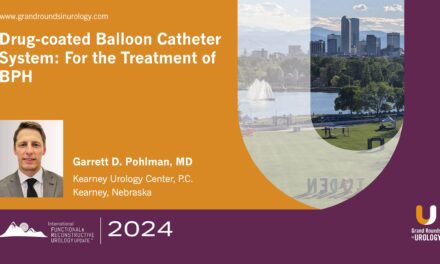Peter Albers, MD, presented “Update on PROBASE Trial: Baseline PSA in Young Men (Aged 45 and 50)” during the 9th Global Summit on Precision Diagnosis and Treatment of Prostate Cancer on September 15, 2025.
How to cite: Albers, Peter. “Update on PROBASE Trial: Baseline PSA in Young Men (Aged 45 and 50).” September 15, 2025. Accessed Dec 2025. https://grandroundsinurology.com/update-on-probase-trial-baseline-psa-in-young-men-aged-45-and-50-2-2/
Update on PROBASE Trial: Baseline PSA in Young Men (Aged 45 and 50) – Summary
Peter Albers, MD, Professor and Chairman, Department of Urology, Heinrich-Heine-University Düsseldorf, Düsseldorf, Germany, reports updated results from the German PROBASE screening trial. Participants were randomized to receive an initial prostate-specific antigen (PSA) test at age 45 or defer testing until age 50. Men with a prostate-specific antigen (PSA) above 3 ng/mL were recommended for biopsy.
The trial defined a new low-risk group as men with PSA less than 1.5 ng/mL at age 45, encompassing about 90 percent of participants. These men rarely developed tumors and could safely avoid repeat testing for at least five years. Adherence to this risk-adapted algorithm improved over time, with most participants following recommendations. Digital rectal examination (DRE), offered in the deferred group, showed minimal cancer detection.
Updated magnetic resonance imaging (MRI) data in middle-aged men demonstrated challenges in interpretation. Even with experienced academic centers and expert radiologists, substantial variability existed between local and reference readings. Nearly half of the men had Prostate Imaging Reporting and Data System (PI-RADS) 3 findings, and cancers were sometimes present despite low PI-RADS scores, underscoring the unreliability of MRI accuracy at younger ages. In combined biopsy analyses, systematic biopsies detected more cancers than targeted biopsies, leading investigators to explore perilesional or “penumbra” biopsy strategies.
The trial also developed a personalized prevention clinic for men with family history or germline variants, integrating genetic panels with MRI and tailored surveillance. Dr. Albers asserts that baseline PSA remains a valid foundation for risk-adapted screening, reducing unnecessary procedures while capturing clinically relevant cancers. Ongoing work will refine imaging quality, biopsy approaches, and long-term screening protocols.
The Global Summit on Precision Diagnosis and Treatment of Prostate Cancer is a unique multi-disciplinary forum organized to inform the key health care stakeholders about the emerging advances in clinical case and research and create a consensus-based vision for the future of precision care and educational and research strategy for its realization. The mission of the Summit is to fill the currently existing gap between the key experts of in vivo imaging, the world authorities in the in vitro fluid- and tissue-based molecular diagnostics, including genomics, and thought leaders in the development of novel observation strategies (e.g., active surveillance, or AS) and therapeutic interventions.
ABOUT THE AUTHOR
Peter Albers, MD, is a Board Member of the European Cancer Organization and Professor of Urology and Chairman of the Department of Urology, Heinrich-Heine-University Düsseldorf, Germany. From 2018 to 2022, he served as Medical Director of the CIO Düsseldorf, Comprehensive Cancer Center at the University Hospital Düsseldorf. In January 2020 he was double appointed Division Head of the newly established Division “Personalized Early Detection of Prostate Cancer” in the National Cancer Prevention Center of the German Cancer Research Center (DKFZ) in Heidelberg.
His special research interests are the development of new risk-adapted screening programs for prostate cancer and clinical research in testicular cancer.





